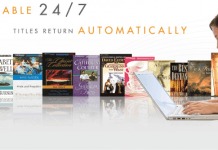
1. “E-books: A Loan at last?” (via Press-Enterprise, Riverside, CA)
A review of what some of the libraries in the SoCal Digital Library offer. SCDL is powered by OverDrive.
Libraries survive by adapting. Remember when they started loaning CDs? DVDs? Installing stationary computers? Now comes what S’Berdoo County library chief Ed Kieczykowski calls the “portable device world” in which patrons will check out e-readers and roam the library at will, downloading anything (within reason) they want.
But not so fast. One library that joined the SoCal Digital Library is taking it slow.
“We’re getting requests for e-books,” said Marilyn Taniguchi, and “as soon as we get the budget,” customers will be able to download them. Yes, she said, “even Beverly Hills (library) has those issues.”
2. “Electronic reading devices are transforming the concept of a book” (via LA Times)
“There is not a single aspect of book publishing that digital won’t touch,” said Carolyn Kroll Reidy, chief executive of Simon & Schuster. “It is transformational.”
About the Vook:
“For me, this is a way to communicate with my readers, establish a connection with them and build a community around them,” [Anne] Rice said in an interview.
Tim O’Reilly, whose O’Reilly Media in Sebastopol, Calif., is at the forefront of designing and distributing digital books over the Internet and on mobile devices, said technology has the power to “broaden our thinking about what a book does.”
“You now have the ability to make a book talk,” said George Kerscher, head of the Digital Accessible Information System Consortium in Zurich, Switzerland. Kerscher, who studied computer science at the University of Montana and is blind, has spent two decades lobbying publishers to make books more accessible to visually impaired readers.
Some of the Sites Mentioned:
+ FanFiction.net
+ TextNovel
+ Scribd
+ GoodReads.com
Dr. Gary Small, director of the Center on Aging at UCLA and author of “iBrain,” said Internet use activated more parts of the brain than reading a book did.
On the other hand, online readers often demonstrate what Small calls “continuous partial attention” as they click from one link to the next. The risk is that we become mindless ants following endless crumbs of digital data. “People tend to ask whether this is good or bad,” he said. “My response is that the tech train is out of the station, and it’s impossible to stop.”
3. Video: “E-books and even movies downloaded for Free”
A Flint, MI TV station reports on the arrival of ebooks from OverDrive and a visit from the OverDrive Bookmobile
4. “Traditional books ‘may not survive electronic age’”(via BBC News)
Books may not survive in their current form as reading habits change during the electronic age, an expert has said.
Dr Bill Bell, from the University of Edinburgh, said the book format was going through a “seismic shift”.
Books may need to be adapted to include technology, he said, as new devices now encouraged different reading styles.
5. Librarian’s answers come by the books (via the Daytona News-Journal)
Despite the rapid transition to electronic information, the need for a traditional reference desk will continue, [librarian Sean] Hurley says. Especially so long as there are teachers who require students to cite books rather than Internet websites. However, Hurley wishes he could convince teachers it’s OK to use the library’s electronic reference system to find and reference magazine articles.
People say everything will be electronic some day, Hurley says, but he doesn’t buy it.
“I think people will always want to hold a book in their hands.”
6. China Copyright Disputes Threaten E-Book Industry (Information Week)
It’s getting increasingly difficult to obtain legitimate copyrights in what could potentially be the largest e-book market in the world. In some cases, agents purport to represent a collection of content providers, but often overstate the true size of their library, leaving the licensee open to additional claims.
Content providers complain that e-books bring little benefit to them at this stage and thus many are reluctant to issue digitized versions, disrupting the supply chain. Top publishers say the environment means that most of the copyrights released to e-book manufacturers are for content that is at least two years old.
See Also: eBooks, New Technologies and Libraries (Press Roundup; July 13, 2010)
Editor’s Note: the original of this post, reprinted with permission, can be found at Resource Shelf. PB.

































